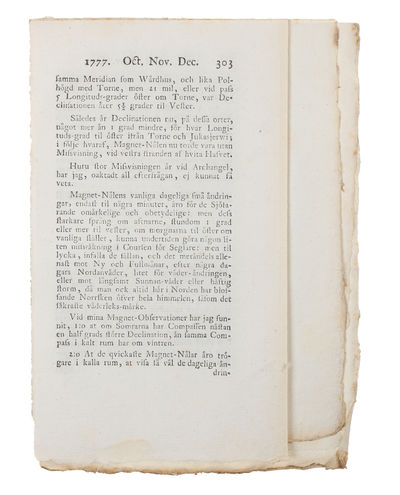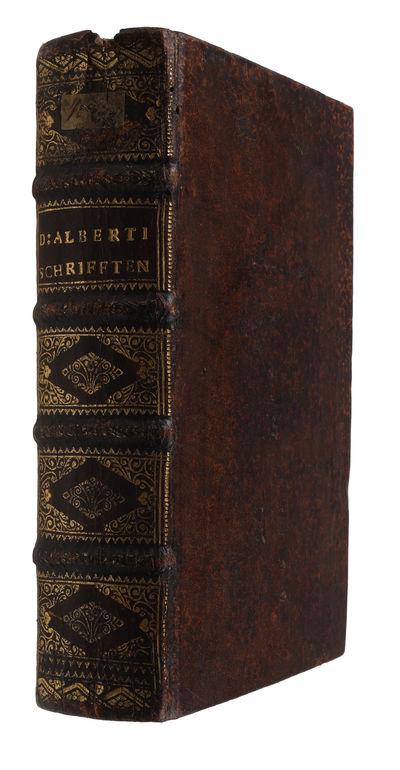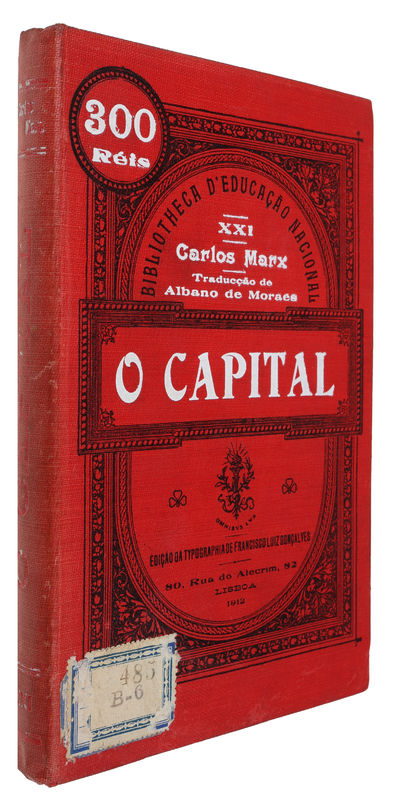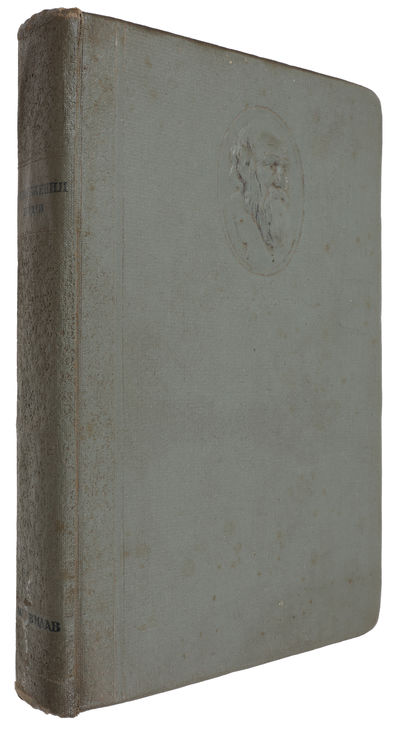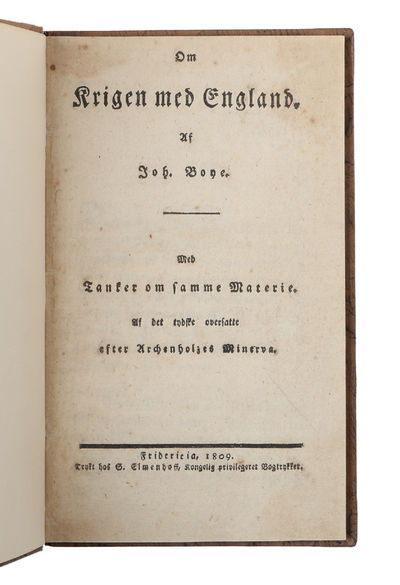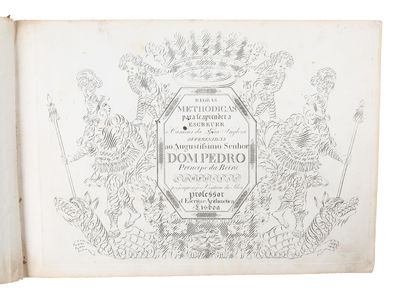FOURIER, CH. [FRANÇOIS MARIE CHARLES].
Traité de l'association domestique-agricole. 2 Vols. (+) Sommaire du traité de l'association domestique-agricole ou attraction industrielle. - [FOUNDING UTOPIAN SOCIALISM AND COINING "FEMINIST"]
Herman H. J. Lynge & Søn A/S
lyn48285
Paris, Bossange père; Londres, Martin Bossange et Comp., 1822 & 1823. 8vo. [Traité:] Two lovely contemporary, uniform half calf bindings with gilding and blindstamped ornamentations to spines. "E. C." in gilt lettering to top of spine on both volumes + [Sommaire:] a bit later red half cloth with marbled paper over boards. Gilt title to spine. [Traité]: signed by the author on verso of half-title in vol. 1: "Ch Fourier". Title-page of vol. 1 with a small light brown stain (probably candle-starin), far from affecting lettering. Both volumes in lovely condition, with only very light occassional brownspoting. LXXX, 592 pp.; VIII, 648 pp. [Sommaire:] Title-page slightly browned, evenly. Otherwise very nice, clean, and fresh. 16 pp, pp. (1329) -1448 + 4 ff. (= (A8 (unnumbered) - on two leaves, first recto and second verso blank) + B8, C8, D8, E8).A lovely set.
Scarce first edition of Fourier's milestone work of political theory, which is considered a founding work of Utopian Socialism and a main inspiration for Marx. The work, which contains "the essence of Fourier's doctrine" (David Owen Evans, Social Romanticism in France 1830-1848, p. 129.), is here presented together with the exceedingly rare complete supplement, which was published the following year.It is in the "Traité..." that Fourier presents the revolutionary ideas that Marx were to adopt and use in his "Kapital", namely the theory of poverty and exploitation and its relation to the means of production. These same ideas are those that made Marx speak of Fourier's "Gargantuan view of man".It is due to the "Traité de l'association" that Fourier is considered one of the founding fathers of Utopian Socialism (being by far the most utopian of them); in his quest for a more equal society, he became one of the very first to defend things such as same-sex sexuality and the rights of women - in fact, it is Fourier that later coins the word "Feministe", while stating that the position of women in society was equal to that of slaves. Many of his publications preceded those of de Saint-Simon, Owens, and Marx, but his ideas seemed to find greater influence when interpreted by others. Due to the lack of success of the "Traité", Fourier decided, the following year, to publish the "Sommaire", in an attempt to draw attention to his revolutionary ideas in the "Traité". The "Sommaire" constitutes a short, more easily understood, summary, though also containing some additional new work. The "Sommaire" is often referred to as "The Appendix" to the "Traité" and is considered as belonging to that work. One of the central themes of the work is the thought of "harmony": "The word harmonisme - here fully explained and described for the first time - was first applied to the highest of the passions or motives of humankind; then (as a synonym for Harmonie) to the ultimate stage of social evolution. The fortunate inhabitants of the perfected world he called harmoniens, a word coined in the present work. These words were duly translated by the Fourierites of other lands. Harmony, the Harmonic state, Harmonization, or integral contrasted association, were the terms used in the earliest English translations in 1841 to describe Fourier's proposed social system; and Harmonism was employed in the 1850's. The inhabitants were spoken of as Harmonians; and Fourier's philosophy as a whole was sometimes described as the Harmonian Doctrine. Even the word harmonious was called into service as a technical term, one English disciple writing of a Harmonious Phalanx." (Bestor, The Evolution of the Socialist Vocabulary, p. 264).Charles Fourier claimed to find inspiration in the exorbitant price of an apple in a Parisian restaurant and he convinced himself that he could design a more efficient way to produce and deliver goods. Unlike other socialists of his day, Fourier believed that the pursuit of self interest served as an effective incentive to productive work. He simply did not believe that the market economy of his day successfully mobilized the pursuit of self interest for the common good and he was offended by the low productivity of labor. He argued that most people were employed in deadening jobs that failed to fully utilize their energies, and that nearly two thirds of all workers were performing virtually useless tasks. A more efficient economic organization promised enormous benefits to all if only a benefactor capitalist would advance the money necessary to set up the first community or ''phalanstery''.Phalanxes, structures called Phalanstères or "grand hotels", were four level apartment complexes where the richest had the uppermost apartments and the poorest occupied the ground floor residence. Wealth was determined by one's job, jobs were assigned based on the interests and desires of the individual. There were incentives: jobs people might not enjoy doing would receive higher pay. Fourier considered trade, which he associated with Jews, to be the "source of all evil" and advocated that Jews be forced to perform farm work in the phalansteries. Furthermore he believed that there were twelve common passions which resulted in 810 types of character (it is not clear why exactly this number), so the ideal phalanx would have exactly 1620 people. One day there would be six million of these, loosely ruled by a world "omniarch", or a World Congress of Phalanxes.Fourier and his contemporaries such as Owen and Saint-Simon were named utopian socialist because of their visions of imaginary ideal societies. Many saw them as not being grounded in the material conditions of society and as reactionary. Despite Fourier's lacking sense of practicality his ideas profoundly influenced all later socialist political and economic though; Not only was he immortalized by Marx, "John Stuart Mill shared the same enthusiasm for Fourier as did the German Marx and Engels and the American George Ripley. Fourier's was "the most skillfully combined, and with the greatest foresight of objections, of all the forms of Socialism." (Feuer, The Influence of the American Communist Colonies on Engels and Marx, P. 466). Fourier's views inspired in the mid 19. century the founding of the communities in Utopia, Ohio, La Reunion near present-day Dallas, Texas and several other communities within the United States of America, including the North American Phalanx in Red Bank, New Jersey; Brook Farm in West Roxbury, Massachusetts and the Community Place and Sodus Bay Phalanx in New York State.In the mid 20th Century, Fourier's influence began to rise again among writers appraising socialist ideas outside the Marxist doctrines. After the Surrealists had broken with the French Communist Party, André Breton turned to Fourier, writing Ode à Charles Fourier in 1947."Traité de l'association domestique-agricole ":Kress C864 Goldsmiths 23694 Einaudi 1960 (including both works). "Sommaire du traité":Kress C1060Goldsmiths 23997.
Scarce first edition of Fourier's milestone work of political theory, which is considered a founding work of Utopian Socialism and a main inspiration for Marx. The work, which contains "the essence of Fourier's doctrine" (David Owen Evans, Social Romanticism in France 1830-1848, p. 129.), is here presented together with the exceedingly rare complete supplement, which was published the following year.It is in the "Traité..." that Fourier presents the revolutionary ideas that Marx were to adopt and use in his "Kapital", namely the theory of poverty and exploitation and its relation to the means of production. These same ideas are those that made Marx speak of Fourier's "Gargantuan view of man".It is due to the "Traité de l'association" that Fourier is considered one of the founding fathers of Utopian Socialism (being by far the most utopian of them); in his quest for a more equal society, he became one of the very first to defend things such as same-sex sexuality and the rights of women - in fact, it is Fourier that later coins the word "Feministe", while stating that the position of women in society was equal to that of slaves. Many of his publications preceded those of de Saint-Simon, Owens, and Marx, but his ideas seemed to find greater influence when interpreted by others. Due to the lack of success of the "Traité", Fourier decided, the following year, to publish the "Sommaire", in an attempt to draw attention to his revolutionary ideas in the "Traité". The "Sommaire" constitutes a short, more easily understood, summary, though also containing some additional new work. The "Sommaire" is often referred to as "The Appendix" to the "Traité" and is considered as belonging to that work. One of the central themes of the work is the thought of "harmony": "The word harmonisme - here fully explained and described for the first time - was first applied to the highest of the passions or motives of humankind; then (as a synonym for Harmonie) to the ultimate stage of social evolution. The fortunate inhabitants of the perfected world he called harmoniens, a word coined in the present work. These words were duly translated by the Fourierites of other lands. Harmony, the Harmonic state, Harmonization, or integral contrasted association, were the terms used in the earliest English translations in 1841 to describe Fourier's proposed social system; and Harmonism was employed in the 1850's. The inhabitants were spoken of as Harmonians; and Fourier's philosophy as a whole was sometimes described as the Harmonian Doctrine. Even the word harmonious was called into service as a technical term, one English disciple writing of a Harmonious Phalanx." (Bestor, The Evolution of the Socialist Vocabulary, p. 264).Charles Fourier claimed to find inspiration in the exorbitant price of an apple in a Parisian restaurant and he convinced himself that he could design a more efficient way to produce and deliver goods. Unlike other socialists of his day, Fourier believed that the pursuit of self interest served as an effective incentive to productive work. He simply did not believe that the market economy of his day successfully mobilized the pursuit of self interest for the common good and he was offended by the low productivity of labor. He argued that most people were employed in deadening jobs that failed to fully utilize their energies, and that nearly two thirds of all workers were performing virtually useless tasks. A more efficient economic organization promised enormous benefits to all if only a benefactor capitalist would advance the money necessary to set up the first community or ''phalanstery''.Phalanxes, structures called Phalanstères or "grand hotels", were four level apartment complexes where the richest had the uppermost apartments and the poorest occupied the ground floor residence. Wealth was determined by one's job, jobs were assigned based on the interests and desires of the individual. There were incentives: jobs people might not enjoy doing would receive higher pay. Fourier considered trade, which he associated with Jews, to be the "source of all evil" and advocated that Jews be forced to perform farm work in the phalansteries. Furthermore he believed that there were twelve common passions which resulted in 810 types of character (it is not clear why exactly this number), so the ideal phalanx would have exactly 1620 people. One day there would be six million of these, loosely ruled by a world "omniarch", or a World Congress of Phalanxes.Fourier and his contemporaries such as Owen and Saint-Simon were named utopian socialist because of their visions of imaginary ideal societies. Many saw them as not being grounded in the material conditions of society and as reactionary. Despite Fourier's lacking sense of practicality his ideas profoundly influenced all later socialist political and economic though; Not only was he immortalized by Marx, "John Stuart Mill shared the same enthusiasm for Fourier as did the German Marx and Engels and the American George Ripley. Fourier's was "the most skillfully combined, and with the greatest foresight of objections, of all the forms of Socialism." (Feuer, The Influence of the American Communist Colonies on Engels and Marx, P. 466). Fourier's views inspired in the mid 19. century the founding of the communities in Utopia, Ohio, La Reunion near present-day Dallas, Texas and several other communities within the United States of America, including the North American Phalanx in Red Bank, New Jersey; Brook Farm in West Roxbury, Massachusetts and the Community Place and Sodus Bay Phalanx in New York State.In the mid 20th Century, Fourier's influence began to rise again among writers appraising socialist ideas outside the Marxist doctrines. After the Surrealists had broken with the French Communist Party, André Breton turned to Fourier, writing Ode à Charles Fourier in 1947."Traité de l'association domestique-agricole ":Kress C864 Goldsmiths 23694 Einaudi 1960 (including both works). "Sommaire du traité":Kress C1060Goldsmiths 23997.
Adresse:
Silkegade 11
DK-1113 Copenhagen Denmark
Telefon:
CVR/VAT:
DK 16 89 50 16
E-post:
Nettsted:
![Traité de l'association domestique-agricole. 2 Vols. (+) Sommaire du traité de l'association domestique-agricole ou attraction industrielle. - [FOUNDING UTOPIAN SOCIALISM AND COINING "FEMINIST"] (photo 1)](https://d3525k1ryd2155.cloudfront.net/h/255/990/1035990255.0.l.0.jpg)
![Traité de l'association domestique-agricole. 2 Vols. (+) Sommaire du traité de l'association domestique-agricole ou attraction industrielle. - [FOUNDING UTOPIAN SOCIALISM AND COINING "FEMINIST"] (photo 2)](https://d3525k1ryd2155.cloudfront.net/h/255/990/1035990255.1.l.0.jpg)
![Traité de l'association domestique-agricole. 2 Vols. (+) Sommaire du traité de l'association domestique-agricole ou attraction industrielle. - [FOUNDING UTOPIAN SOCIALISM AND COINING "FEMINIST"] (photo 3)](https://d3525k1ryd2155.cloudfront.net/h/255/990/1035990255.2.l.0.jpg)
